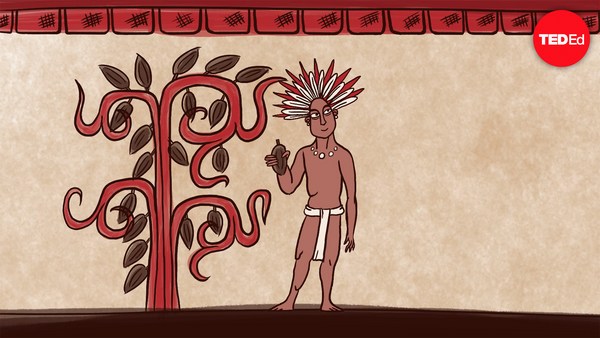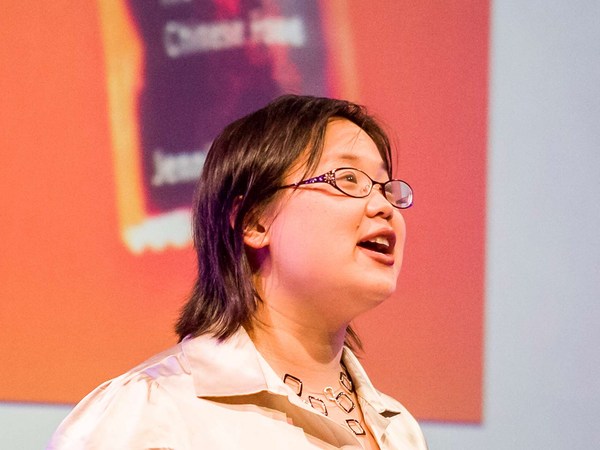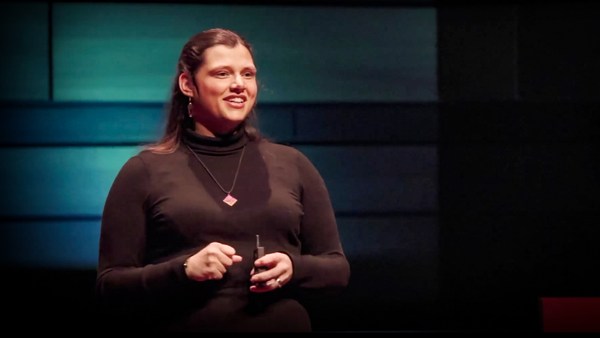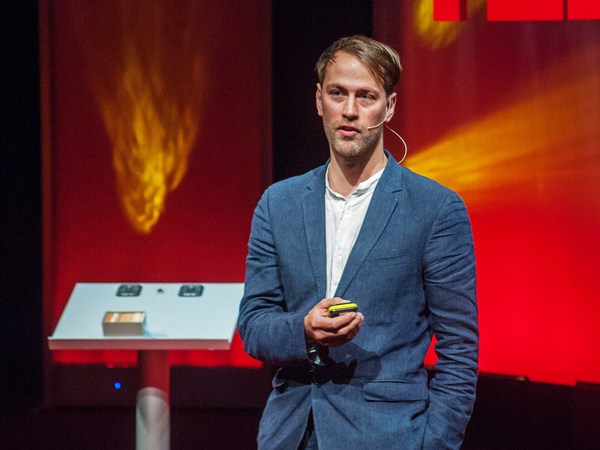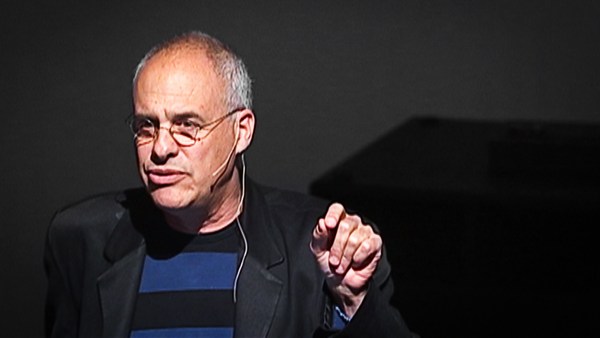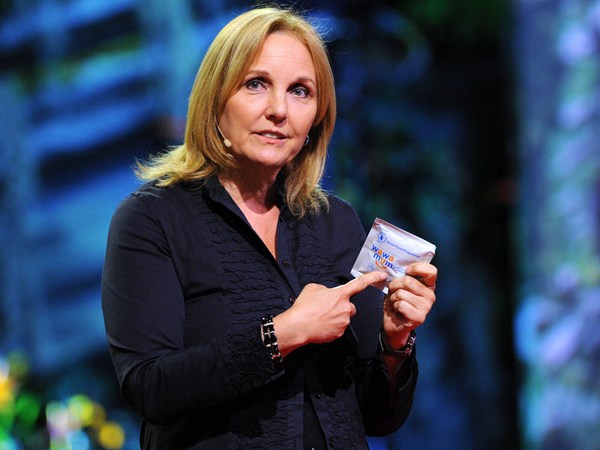Last year, I was living with this indigenous family in India. One afternoon, the young son was eating, and at the sight of me, he quickly hid his curry behind his back. It took a lot of persuasion to get him to show me what he was eating. It turned out to be moth larvae, a traditional delicacy with the Madia indigenous people. I cried, "Oh my God, you're eating these! I hope there's a little left for me!" I saw disbelief in the boy's eyes.
"You ... eat these?"
"I love these," I replied.
I could see he did not trust me one bit. How could an urban, educated woman like the same food as him? Later, I broached the subject with his father, and it turned out to be a mighty touchy affair. He said things like, "Oh, only this son of mine likes to eat it. We tell him, 'Give it up. It's bad.' He doesn't listen, you see. We gave up eating all this ages back."
"Why?" I asked. "This is your traditional food. It is available in your environment, it is nutritious, and -- I can vouch for it -- delicious. Why is it wrong to eat it?"
The man fell silent.
I asked, "Have you been told that your food is bad, that to eat it is backward, not civilized?"
He nodded silently.
This was one of the many, many times in my work with indigenous people in India that I witnessed shame around food, shame that the food you love to eat, the food that has been eaten for generations, is somehow inferior, even subhuman. And this shame is not limited to out-of-the-way, icky foods like insects or rats, maybe, but extends to regular foods: wild vegetables, mushrooms, flowers -- basically, anything that is foraged rather than cultivated.
In indigenous India, this shame is omnipresent. Anything can trigger it. One upper-caste vegetarian schoolmaster gets appointed in a school, within weeks, children are telling their parents it's yucky to eat crabs or sinful to eat meat. A government nutrition program serves fluffy white rice, now no one wants to eat red rice or millets. A nonprofit reaches this village with an ideal diet chart for pregnant women. There you go. All the expectant mothers are feeling sad that they cannot afford apples and grapes. And people just kind of forget the fruits that can be picked off the forest floor. Health workers, religious missionaries, random government employees and even their own educated children are literally shouting it down at the indigenous people that their food is not good enough, not civilized enough. And so food keeps disappearing, a little bit at a time.
I'm wondering if you all have ever considered whether your communities would have a similar history around food. If you were to talk to your 90-year-old grandmother, would she talk about foods that you have never seen or heard of? Are you aware how much of your community's food is no longer available to you?
Local experts tell me that the South African food economy is now entirely based on imported foods. Corn has become the staple, while the local sorghum, millets, bulbs and tubers are all gone. So are the wild legumes and vegetables, while people eat potatoes and onions, cabbages and carrots.
In my country, this loss of food is colossal. Modern India is stuck with rice, wheat and diabetes. And we have totally forgotten foods like huge varieties of tubers, tree saps, fish, shellfish, oil seeds, mollusks, mushrooms, insects, small, nonendangered animal meats, all of which used to be available right within our surroundings.
So where has this food gone? Why are our modern food baskets so narrow? We could talk about the complex political economic and ecological reasons, but I am here to talk about this more human phenomenon of shame, because shame is the crucial point at which food actually disappears off your plate.
What does shame do? Shame makes you feel small, sad, not worthy, subhuman. Shame creates a cognitive dissonance. It distorts food stories.
Let us take this example. How would you like to have a wonderful, versatile staple that is available abundantly in your environment? All you have to do is gather it, dry it, store it, and you have it for your whole year to cook as many different kinds of dishes as you want with it. India had just such a food, called "mahua," this flower over there. And I have been researching this food for the past three years now. It is known to be highly nutritious in indigenous tradition and in scientific knowledge. For the indigenous, it used to be a staple for four to six months a year. In many ways, it is very similar to your local marula, except that it is a flower, not a fruit. Where the forests are rich, people can still get enough to eat for the whole year and enough spare to sell.
I found 35 different dishes with mahua that no one cooks anymore. This food is no longer even recognized as a food, but as raw material for liquor. You could be arrested for having it in your house. Reason? Shame. I talked to indigenous people all over India about why mahua is no longer eaten. And I got the exact same answer. "Oh, we used to eat it when we were dirt-poor and starving. Why should we eat it now? We have rice or wheat." And almost in the same breath, people also tell me how nutritious mahua is. There are always stories of elders who used to eat mahua. "This grandmother of ours, she had 10 children, and still she used to work so hard, never tired, never sick." The exact same dual narrative every single where. How come? How does the same food get to be seen as very nutritious and a poverty food, almost in the same sentence?
Same goes for other forest foods. I have heard story after heartrending story of famine and starvation, of people surviving on trash foraged out of the forest, because there was no food. If I dig a little deeper, it turns out the lack was not of food per se but of something respectable like rice. I asked them, "How did you learn that your so-called trash is edible? Who told you that certain bitter tubers can be sweetened by leaving them in a stream overnight? Or how to take the meat out of a snail shell? Or how to set a trap for a wild rat?" That is when they start scratching their heads, and they realize that they learned it from their own elders, that their ancestors had lived and thrived on these foods for centuries before rice came their way, and were way healthier than their own generation.
So this is how food works, how shame works: making food and food traditions disappear from people's lives and memories without their even realizing it.
So how do we undo this trend? How do we reclaim our beautiful and complex systems of natural food, food given to us lovingly by Mother Earth according to her own rhythm, food prepared by our foremothers with joy and are eaten by our forefathers with gratitude, food that is healthy, local, natural, varied, delicious, not requiring cultivation, not damaging our ecology, not costing a thing? We all need this food, and I don't think I have to tell you why. I don't have to tell you about the global health crisis, climate change, water crisis, soil fatigue, collapsing agricultural systems, all that. But for me, equally important reasons why we need these foods are the deeply felt ones, because food is so many things, you see. Food is nourishment, comfort, creativity, community, pleasure, safety, identity and so much more.
How we connect with our food defines so much in our lives. It defines how we connect with our bodies, because our bodies are ultimately food. It defines our basic sense of connection with our existence. We need these foods most today to be able to redefine our space as humans within the natural scheme of things. And are we needing such a redefinition today?
For me, the only real answer is love, because love is the only thing that counters shame. And how do we bring more of this love into our connections with our food? For me, love is, in a big way, about the willingness to slow down, to take the time to feel, sense, listen, inquire.
It could be listening to our own bodies. What do they need beneath our food habits, beliefs and addictions? It could be taking time out to examine those beliefs. Where did they come from? It could be going back into our childhood. What foods did we love then, and what has changed? It could be spending a quiet evening with an elder, listening to their food memories, maybe even helping them cook something they love and sharing a meal. Love could be about remembering that humanity is vast and food choices differ. It could be about showing respect and curiosity instead of censure when we see somebody enjoying a really unfamiliar food. Love could be taking the time to inquire, to dig up information, reach out for connections. It could even be a quiet walk in the fynbos to see if a certain plant speaks up to you. That happens. They speak to me all the time.
And most of all, love is to trust that these little exploratory steps have the potential to lead us to something larger, sometimes to really surprising answers. An indigenous medicine woman once told me that love is to walk on Mother Earth as her most beloved child, to trust that she values an honest intention and knows how to guide our steps.
I hope I have inspired you to start reconnecting with the food of your ancestors.
Thank you for listening.
(Applause)
